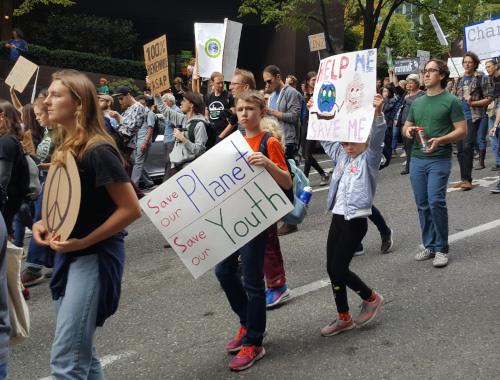SUBSCRIBE TO THE FREE NEWSLETTER
Youth strikes for climate action across Cascadia
Inspired by the 16-year-old activist Greta Thunberg, more than 4 million young people and adults marched in 2,500 events in 150 countries worldwide on Friday to draw attention to the global climate crisis. Across Cascadia, young people and their allies walked out of classes and called for political action.
In Portland, tens of thousands of teens marched in the streets to city hall, where they demanded immediate action on a Green New Deal.
In Vancouver, BC, students staged a “die-in” on the steps of the Vancouver Art Gallery to call attention to extinctions caused by anthropogenic climate change.
In Campbell River, on Vancouver Island, Andrew Nikiforuk (who writes for The Tyee) gave this speech about the urgent need for action: “Our ravenous consumption of things is driving the extinction of birds, mammals, insects and fish. And Indigenous people.”
A thousand students in Nelson, BC walked out and one student was quoted in the Nelson Star: ““If you don’t start acting like adults, we will!”
Thousands of young people marched in Eugene and Salem, Oregon.
In the Washington’s Puget Sound region, KNKX reports on protests in Tacoma, Bellingham, and Olympia, where one student said ““I’m hoping that politicians and adults of all ages who tend to not listen to youth see that this event was put on by youth and led by youth and we’re powerful and we’re not going to stay complacent,” she said. “We’re not taking no for an answer.”
In Seattle, thousands of kids and adults marched to city hall the Seattle Times reports even though Seattle Public Schools treated student walkouts as an unexcused absence (and they hope you don’t remember that they let students skip school to attend a parade for the Seahawks after they won the Super Bowl).
Crosscut profiles young climate activists in Seattle, including 13-year-old Zoe Schurman who was arrested at city hall in August for spray painting a message “Strike For Our Futures” (the can was labeled “chalk”) and now leads Fridays for a Future protests. –Andrew Engelson
Climate change at Cascadia Magazine: Coring the Forest
Paul Lask won an award from the Society of Professional Journalists for his feature “Coring the Forest” published last year at Cascadia Magazine that profiles an all-women crew taking core samples of trees in Oregon’s Blue Mountains. Their work is helping scientists better understand how climate change and fire suppression are changing the ecology of Cascadia’s forests. Read the full feature here.
New potential for wind energy off Oregon coast
OPB profiles a conference in Portland that is investigating the potential of wind energy generation offshore of the Oregon coast: thanks to lower costs and some of the most consistent wind patterns in North America, the future looks bright.
Washington’s Methow Valley prepares for wildfires
As climate change increases conditions for wildfire across Cascadia, residents of of the Methow Valley in central Washington are coming together to prepare for and protect their communities from wildfire risk, Nia Martin reports at Bitterroot. “I’m keenly interested in dry forest restoration, and our community and ecosystems becoming more resistant to climate change and warmer, drier summers,” says one resident.
Creating sanctuary for orcas in the Salish Sea
The Narwhal reports on efforts in British Columbia’s Gulf Islands to increase protected areas for orca habitat, which are feeling pressure from habitat loss, food decline and the affects of climate change. But these sanctuary efforts are stymied by lack of similar action on the US side of the border.
Oysters stunted by ocean acidification
KUOW reports on new study that finds that the survival of young oysters in the Pacific Northwest in under threat from ocean acidification, a by-product of warming oceans heated by climate change.
Four Seattle artists tackling climate change
Gayle Clemens at The Seattle Times profiles four visual artists creating work that seeks to push people to action on climate through appeals to the emotions, including Robert Campbell who creates video installations including one titled Solastalgia (a relatively new term that describes the sense of sadness and loss one feels in reaction to climate change). Also featured is Carol Rashawnna Williams, who looks at how climate change disproportionately affects communities of color.
“Ice Would Suffice,” poetry by Risa Denenberg
The American Academy of Poets offers up today a selection of poems that confront climate change, and among them is “Ice Would Suffice,” by Risa Denenberg, who lives in Sequim, WA. Inspired by Robert Frost, Leonard Cohen, and Doris Lessing, the poem is comfortable with an awareness of species mortality:
“Empires fail, species are lost,
spotted frogs
and tufted puffins forsaken.
After eons of fauna and flora, hominids have stood
for mere years
baffled brains atop battered shoulders.”
Read the full poem here. That’s today’s Climate Strike edition of Cascadia Daily. Hope you’re feeling as inspired as I am by the youth of the Pacific Northwest, who’re calling on older generations to take action. To find out more about how you can work for change on climate in Cascadia, visit Cascadia Climate Action. ?? Have a great weekend! –Andrew Engelson
Photo credits: Seattle Youth Climate Strike by Andrew Engelson

